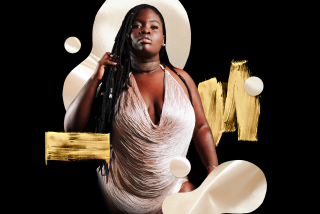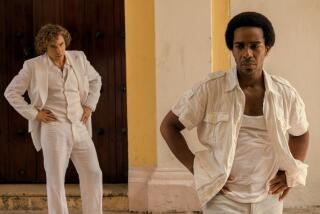Inhaling Freedom : Cuban Emigrant Miguel Gonzales Savors Life in the U.S. as Owner of a Cigar Factory. He Contends That Tobacco Has Social Benefits.
On a busy corner in Huntington Park lies Robert’s Cigars Factory, the lifeblood of Cuban emigrant Miguel Gonzales. Gonzales, 52, came to the United States with his wife and two children in 1980 during the Mariel boat lift. Upon entering Robert’s Cigars Factory, the sounds and smells of Cuba fill the air--a portable CD player emits rumbas amid the aroma of dried tobacco leaves. A lifelong tabaquero from a family of tabaqueros , Gonzales was interviewed by Simon Romero .
I came here with nothing from a country that was destroyed, a beautiful country full of hate, where words are weapons. I came, with my family, in search of liberty and began with zero. Now I have my factory, and though I’m not rich, I like what I do and I’m satisfied with the life I’ve made.
I still follow politics but only as an observer. A man who owns his own business has to be like that. In any case, tobacco will last longer than any government or regime; tobacco has been with us for centuries and will remain with us for a very long time.
The process of making cigars isn’t easy--it’s as work-intensive as any job can get. In these rooms, my wife and I work 10 hours a day, five days a week. We take no vacations. I haven’t visited Cuba since I left and I don’t plan to go back. My children were raised in this country and this is where their future is.
I put everything I have into this operation, and when I see the fruit of our labor--a slow-burning, tightly rolled handmade cigar--being enjoyed by my clients, I feel proud. I myself made the machines we use to dry the tobacco and roll it up into tightly wound wads.
When I left my country, I brought with me the knowledge of every level of cigar-making, from harvesting the crops--which is the hardest work of all, since the tobacco seeps into the pores of your skin--to drying the plants to rolling them into long habaneros. Now, none of our equipment or tobacco leaves are imported from Cuba, since I honor the current embargo.
The leaves we use for our cigars generally come from Central America or Santo Domingo. Sometimes, if one of my clients goes to a place like Turkey, I ask him to bring back some of their leaves. Turkish tobacco has a very good reputation--but it’s not for the weak.
Since Cuban tobacco has no equal, Cuban cigars are valued throughout the world. Even in this country, a person can find Cuban cigars if he looks in the right places, asks the right people. Most come through Canada or Mexico, since those two countries still do business with Castro; they still send thousands of tourists to stay in ritzy hotels along nice beaches.
And doing so, they keep him and his government alive. Castro is completely dependent on the dollars tourists bring with them. Perhaps someday, after Castro falls, I’ll be able to import Cuban leaves, especially those from the Oriente Province, which is where my family is from. The leaves from Oriente are as large as they come and when they’re picked, they glisten with a wet dew.
The dew gives them a fatter, richer taste, but it also makes them more difficult to dry than other leaves. It would be foolish to immediately roll one of these leaves into a cigar and smoke it, since the sting to the mouth would be too great. Tobacco anywhere, like the wine they make here in California, needs time to age properly.
Usually, the harvested leaves we use arrive here in June, and that’s when we begin preparing our stock. After about a year’s rest, we brush the leaves to rid them of impurities, then we gently take the stems off. With the stems gone, we bunch up the tobacco into thin little rolls, then press the leaves into 25 or 50 cigars at a time. It’s a process that requires patience and a lot of sitting.
Business is good since we’re living in a new era of tobacco. Magazines like Cigar Aficionado project a strong, positive image of cigar smokers. I get requests for certain cigars from customers who live in Arizona and Texas. Over the years, I’ve built up a loyal client base of 1,000, which is enough to keep us afloat. It won’t make us rich but it satisfies our needs.
All of this talk of new legislation targeting tobacco as harmful and dangerous is unfortunate. My family has made cigars and smoked all types of tobacco for generations, and we’re known for our longevity and good health.
Tobacco has its advantageous effects on modern societies like ours, where we’re subjected to so much daily stress. There is nothing better than sitting down in your favorite chair to drink a cup of coffee or a glass of wine, and then smoking a good cigar. It brings a solution to any problem you have much closer. It relieves stress and allows you to concentrate on issues that really matter in your life.
Even though people in Cuba have fewer possessions and more immediate worries than Americans, on the whole they’re less neurotic. We spend so much time worrying about things like smoking or what type of chemicals this food or that food has, when we shouldn’t. Then we shy away from things that bring us relaxation and pleasure.
When I arrived here I was a grown man, already nearly 40 years old. Being an immigrant, with little knowledge of English and American ways, I had little choice but to do what I needed to survive. I worked at the El Criollo Market in Bell that’s owned by Cubans, then saved enough money to start this factory.
People ask me why I named it Robert’s, which doesn’t sound too Cuban. I named it for my son Robert, since I wanted to make him proud. He didn’t see a future in cigar-making and now he works at a tire shop, where he makes good money and is happy. And that’s what is important.
More to Read
Sign up for Essential California
The most important California stories and recommendations in your inbox every morning.
You may occasionally receive promotional content from the Los Angeles Times.










